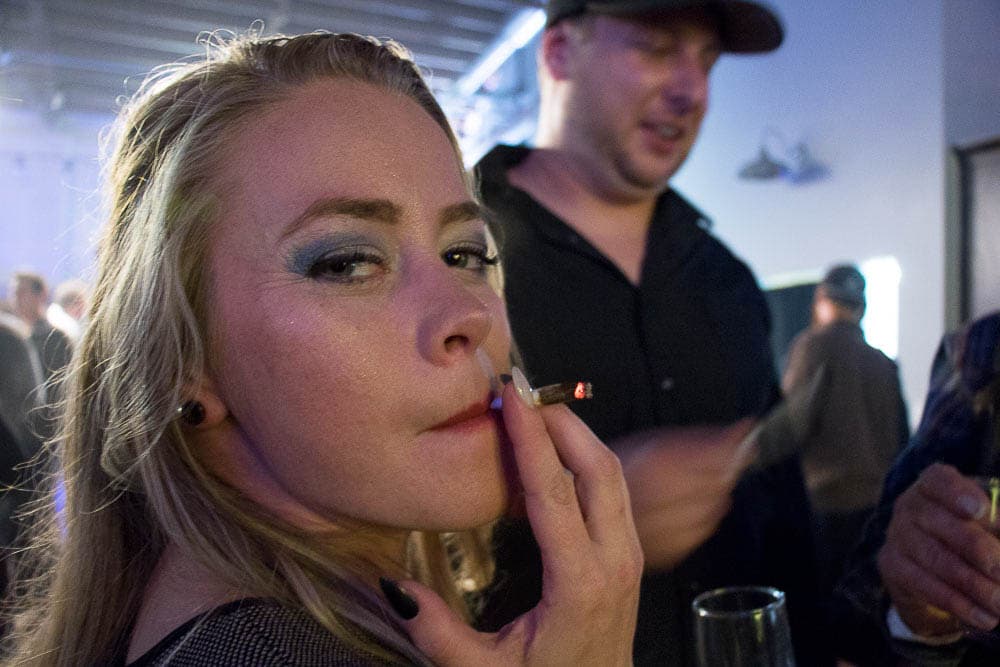
Denver officials finally unveiled their new rules Friday for regulating marijuana use in businesses and at events.
Now Denver Excise and Licenses has to finalize the behind-the-scenes processes to be able to start reviewing and approving permits. The department intends to begin accepting applications by Aug. 31.
"We've always been looking at this as implementing the rules and the laws, whether it's Amendment 64 or Initiative 300, while balancing the needs and the wants of all our community," said Ashley Kilroy, executive director of Excise and Licenses.
The rules that go into effect Saturday look very similar to what residents commented on June 13 at a public hearing with at least one notable exception. Those entering the designated consumption areas — or DCAs — will no longer have to sign waivers acknowledging they are entering a place where people are consuming marijuana and the need for them to consume responsibly. Instead, a sign will be required at the entrances of the DCAs with that information.
I-300, in a nutshell, allows just about any kind of business that doesn’t sell marijuana to apply for a cannabis consumption permit under the Neighborhood-Supported Cannabis Consumption Pilot Program. If approved, a business owner can set up space for people to use marijuana in their business. The pilot program ends in 2020, at which time it can be extended, become permanent or fade out altogether.
Kilroy co-chaired a citizen committee earlier this year to hear from supporters of I-300, opponents and others who might be impacted by the law.
"We've listened to everyone and really made a lot of compromises to meet our values and the values of the community," she said.
Kilroy and her staff declined to listen to appeals from the West Washington Park Neighborhood Association and others asking for a 500-foot buffer between designated consumption areas, particularly outdoor DCAs, and residential zones. Social consumption areas won't be allowed to operate in residential areas themselves, but they can open in commercial and mixed-use zones that abut residential areas, provided they work with neighborhood groups.
Rachel O’Bryan, with the campaign group that fought I-300's passage said in a statement that the rules "fairly balance the desires of marijuana consumers and potential social consumption permit seekers with the needs of all Denver citizens and visitors alike."
Still, O'Bryan said she wished more was done to signal to children that being high is not a "necessary state for ordinary, everyday life."
"We hope that Denver’s dynamic neighborhoods do not become negatively impacted by another layer of marijuana commercialization in a city where there are more marijuana licenses than Starbucks and McDonald’s combined," she said.
The campaign director of I-300, Emmett Reistroffer, said the city "really sided with the prohibitionists" when making its rules.
"If time goes on and there's very few or no permits issued, then we're certainly going to take action whether that's going to City Council or planning another ballot initiative where we will push a much more pointed initiative and actually try to create something that works," Reistroffer said.
Reistroffer and the backers of I-300 called for changes to the draft rules released by Excise and License earlier this year. The group said they were too restrictive. For example, they wanted businesses that sell alcohol to also allow cannabis use on the premises as long as patrons aren’t consuming them at the same time in the same area. The rules didn't end up allowing for that.
Kilroy balked at the idea that the city's new rules are keeping some possible permit holders out.
“Most of the requirements came directly from the language of I-300 itself. I-300 itself required evidence of community support. I-300 and the voters required the responsible operations plan. I-300 requires the health and sanitation plan. And I-300 requires the community engagement plan," she said. "So a lot of the requirements were already in I-300 and then some of the other requirements were mandated by other laws like the Colorado Clean Indoor Air Act, the state prohibition on dual consumption, the state prohibition on open and public consumption and the Cole Memorandum."
The memorandum guides U.S. Attorneys on how to deal with states that have voted to legalize marijuana use. It's unclear how many business owners and event planners will look at the memo and all the other rules and still take a shot at providing Denver with a place to use marijuana.
"We know there are going to be plenty of places for these (DCAs) to locate, but we don’t really know what the demand is going to be from the business community," said Dan Rowland, spokesman for the city. "I don’t think we have a good sense yet of how many permit applications we’re going to get in the first few months or anything like that."
Business & data reporter Adrian D. Garcia can be reached via email at [email protected] or twitter.com/adriandgarcia.
Subscribe to Denverite’s newsletter here.












